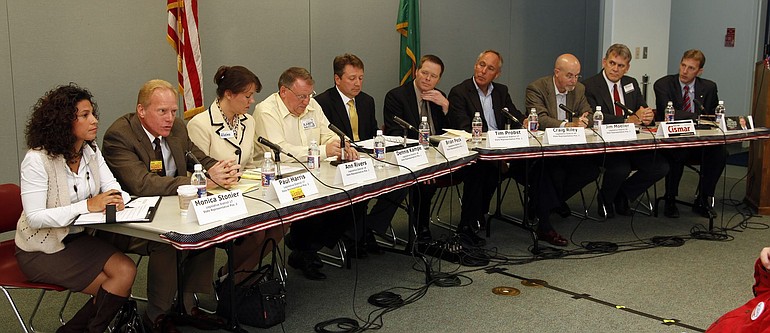Ten candidates in five contested Clark County legislative races fielded questions on the economy, education, health care and transportation for nearly two hours Tuesday — and scarcely a snarky comment was heard.
The forum, sponsored by the Neighborhood Association Council of Clark County and the Vancouver Neighborhood Alliance, was an oasis of civility and substantive discussion in what has become an angry, partisan campaign season.
Not that the candidates agreed. They did not, especially on whether tolls and light rail should be part of the Columbia River Crossing. But they disagreed respectfully.
Taking part in the forum at the Clark Public Utilities Community Room were 49th District candidates Bill Cismar, a Republican, Rep. Jim Jacks, a Democrat, Craig Riley, a Republican, and Rep. Jim Moeller, a Democrat.
Also, 17th District candidates Republican Brian Peck and Democratic Rep. Tim Probst, and Democrat Monica Stonier and Republican Paul Harris. The 18th District candidates are Republican Ann Rivers and Democrat Dennis Kampe.
About 35 people attended the forum, which was broadcast by CVTV.
Each candidate began by describing his or her neighborhood involvement. Each has experience, whether in coaching kids or taking part in neighborhood watch programs or organizing community cleanup campaigns.
Wages, jobs on agenda
Asked by moderator Anne McEnerny-Ogle what they considered a “living wage,” and how the state could help create jobs that pay a living wage, the candidates had different takes.
Referendum 52 on the November ballot is one solution, Jacks said. The measure will help create an estimated 30,000 family-wage jobs retrofitting school buildings by authorizing the state to sell construction bonds.
His opponent, Cismar, questioned how many jobs the measure would create and said it would create $1 billion in new state debt.
“States don’t create jobs,” Cismar declared. “Wealth is something that is created by the private sector.”
Moeller sought a middle ground. “It’s not an either-or situation,” he said. “It’s a combination of the public and private sectors working together. When we have the private sector on its knees, it can’t create jobs. That’s when we need government intervention.”
“We need to get back to a great work ethic,” Probst said. “We need a real commitment to education.” The GI Bill after World War II showed what the nation could do when it committed to providing educational opportunity, he said. “Over the past 30 years, we got away from that.”
Peck said jobs are created when individuals or groups are willing to take financial risks. “Right now investors aren’t investing in new businesses,” he said, because they don’t know what government regulations to expect.
Kampe, longtime director of the Clark County Skills Center, said he considers a family-wage job a job that pays $27 an hour.
“My goal is that all families have family-wage jobs,” he said. “Here’s the crisis we’re in: We are running out of skilled labor. We are now importing skilled labor from other countries.”
Rivers blamed the crisis facing many families and businesses in Clark County on “a lack of stability in state government.” She said the state must get rid of “onerous taxes” and the burdens placed on businesses by workers’ compensation and unemployment payments.
Harris said some businesses are hesitant to invest in Clark County because of the high-earner income tax on the November ballot. An income tax will drive new business away, he warned.
Stonier, a middle school teacher, said a living wage, in her mind, is a wage that gives a person “access to a lifestyle that you are willing to work hard to reach.”
Education that provides a strong return on investment is the answer, she said. “How many of our families can achieve that goal? Right now we don’t have that.”
Asked what the state can do to reduce the high school dropout rate, estimated at 25 percent statewide, many candidates agreed that the problem is not one the state can solve on its own.
“It’s not just the high school dropout rate,” Riley said. “Sixty percent of beginning college students have to go through remedial courses.” The answer, he said, is to “reinvent the involvement of parents in their children’s education.”
Moeller agreed that “parental involvement makes all the difference.” But he said the reality is that the public schools have to “take all comers,” including students who don’t have that advantage.
Cismar said he was inspired by the new hit film “Waiting For Superman,” which he said “takes on” the National Education Association, the nation’s largest teacher union.
“This isn’t a problem the Legislature” or even Congress can resolve, Cismar said. Private and charter schools are part of the solution, he said, as are parent involvement and teacher accountability.
Stonier, who is active in the Washington Education Association, said it’s important to elect a teacher to the Legislature because “right now this conversation is happening without the involvement of teachers.” She said she has the support of both the Washington Education Association and education reform groups, though she doesn’t agree with everything either group is advocating.
“Clarity of purpose for students is key,” Kampe said. That’s something the Skills Center has been able to provide, he said, noting that the program has a 0.5 percent dropout rate. “The State Board of Education needs to get off the bandwagon that every student needs to go to a university.”



